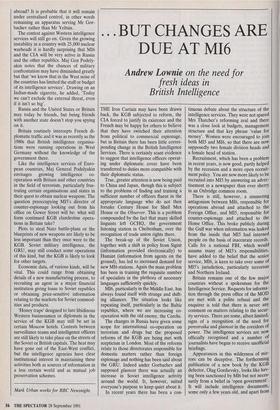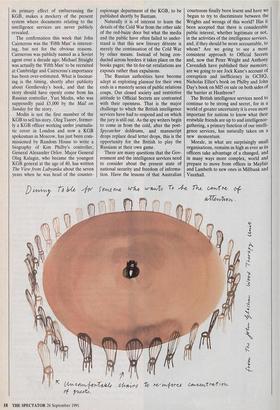.. .BUT CHANGES ARE
DUE AT MI6
fresh ideas in
British Intelligence THE Iron Curtain may have been drawn back, the KGB subjected to reform, the CIA forced to justify its existence and the French may be happy for others to believe that they have switched their attention from political to commercial espionage, but in Britain there has been little corres- ponding change in the British Intelligence Services. There is certainly scant evidence to suggest that intelligence officers operat- ing under diplomatic cover have been transferred to duties more compatible with their diplomatic status.
True, greater attention is now being paid to China and Japan, though this is subject to the problems of finding and training a sufficient number of officers fluent in the appropriate language who do not then forsake Century House for Shell Mex House or the Observer. This is a problem compounded by the fact that many skilled linguists left GCHQ, the government listening station in Cheltenham, over the recognition of trade union rights there.
The break-up of the Soviet Union, together with a shift in policy from Sigint (information provided electronically) to Humint (information from agents on the ground), has led to increased demand for new MI6 stations. Again the main problem has been in training the requisite number of specialists in the plethora of necessary languages sufficiently quickly.
MI6, particularly in the Middle East, has always found itself with strange and shift- ing alliances. The situation looks like repeating itself, particularly in the Baltic republics, where we are increasing co- operation with the old enemy, the Czechs.
The changes in Russia have given some scope for international co-operation on terrorism and drugs but the proposed reforms of the KGB are being met with scepticism in London. Most of the reforms relate to those directorates responsible for domestic matters rather than foreign espionage and nothing has been said about the GRU. Indeed under Gorbachev and supposed glasnost there was actually an increase in Soviet intelligence activity around the world. It, however, suited everyone's purpose to keep quiet about it.
In recent years there has been a con- tinuous debate about the structure of the intelligence services. They were not spared Mrs Thatcher's reforming zeal and there was a close look at budgets, management structure and that key phrase 'value for money'. Women were encouraged to join both MI5 and MI6, so that there are now supposedly two female division heads and a female head of station.
Recruitment, which has been a problem in recent years, is now good, partly helped by the recession and a more open recruit- ment policy. You are now more likely to be recruited into MI5 by answering an adver- tisement in a newspaper than over sherry in an Oxbridge common room.
There is still, however, a simmering antagonism between MI6, responsible for operations abroad and attached to the Foreign Office, and MI5, responsible for counter-espionage and attached to the Home Office. This broke publicly during the Gulf war when information was leaked from the inside that MI5 had interned people on the basis of inaccurate records. Calls for a national FBI, which would' assume many of MI5's responsibilities, have added to the belief that the senior service, MI6, is keen to take over some of MI5's jurisdiction, particularly terrorism and Northern Ireland.
Britain remains one of the few major countries without a spokesman for the Intelligence Service. Requests for informa- tion through the press office of the MOD are met with a polite refusal and the enquirer is told that there is never any comment on matters relating to the secur- ity services. There are some, albeit limited, signs of a recognition of the need for perestroika and glasnost in the corridors of power. The intelligence services are now officially recognised and a number of journalists have begun to receive unofficial briefings.
Appearances in this wilderness of mir- rors can be deceptive. The forthcoming publication of a new book by the KGB defector, Olag Gordievsky, looks like hav- ing been sanctioned by MI6 but not neces- sarily from a belief in 'open government'. It will include intelligence documents, some only a few years old, and apart from its primary effect of embarrassing the KGB, makes a mockery of the present system where documents relating to the intelligence services are never publicly revealed.
The confirmation this week that John Cairncross was the 'Fifth Man' is interest- ing, but not for the obvious reasons. Cairncross was publicly named as a Soviet agent over a decade ago; Michael Straight was actually the 'Fifth Man' to be recruited at Cambridge and Cairncross's importance has been over-estimated. What is fascinat- ing is the timing, shortly after publicity about Gordievsky's book, and that the story should have openly come from his Russian controller, Yuri Modin, who was supposedly paid £5,000 by the Mail on Sunday for the story.
Modin is not the first member of the KGB to sell his story. Oleg Tsarev, former- ly a KGB officer working under journalis- tic cover in London and now a KGB spokesman in Moscow, has just been com- missioned by Random House to write a biography of Kim Philby's controller, General Alexander Orlov. Major General Oleg Kalugin, who became the youngest KGB general at the age of 40, has written The View from Lubyanka about the seven years when he was head of the counter- espionage department of the KGB, to be published shortly by Bantam.
Naturally it is of interest to learn the details of the Cold War from the other side of the red-baize door but what the media and the public have often failed to under- stand is that this new literary détente is merely the continuation of the Cold War by other means. Instead of being con- ducted across borders it takes place on the books pages; the tit-for-tat retaliations are exposés rather than expulsions.
The Russian authorities have become adept at exploiting glasnost for their own ends in a masterly series of public relations coups. Our closed society and restrictive attitude to Official Secrets are contrasted with their openness. That is the major challenge to which the British intelligence services have had to respond and on which the jury is still out. As the spy writers begin to come in from the cold, after the post- Spycatcher doldrums, and manuscript drops replace dead letter drops, this is the opportunity for the British to play the Russians at their own game. There are many questions that the Gov- ernment and the intelligence services need to consider about the present state of national security and freedom of informa- tion. Have the lessons of that Australian courtroom finally been learnt and have we begun to try to discriminate between the Wrights and wrongs of this world? Has it been accepted that there is considerable public interest, whether legitimate or not, in the activities of the intelligence services, and, if they should be more accountable, to whom? Are we going to see a more consistent approach to Official Secrets and, now that Peter Wright and Anthony Cavendish have published their memoirs; are we going to see Jock Kane's account of corruption and inefficiency in GCHQ, Nicholas Elliot's book on Philby and John Day's book on MI5 on sale on both sides of the barrier at Heathrow?
The British intelligence services need to continue to be strong and secret, for in a world of greater uncertainty it is even more important for nations to know what their erstwhile friends are up to and intelligence- gathering, a primary function of our intelli- gence services, has naturally taken on a new momentum.
Morale, in what are surprisingly small organisations, remains as high as ever as its officers take advantage of a changed, and in many ways more complex, world and prepare to move from offices in Mayfair and Lambeth to new ones in Millbank and Vauxhall.



































































 Previous page
Previous page